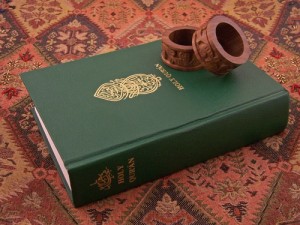Last week, the people who produce the Associated Press Stylebook issued a few revisions. One of them was for the term “Islamist.” It used to read:
Supporter of government in accord with the laws of Islam. Those who view the Quran as a political model encompass a wide range of Muslims, from mainstream politicians to militants known as jihadi.
That entry was only added last year. In response, the Council on American-Islamic Relations actually called for the AP to drop the use of the term. GetReligion authors have long spoken out against the use of the term as imprecise shorthand for “Muslims who are not liberal.” Here’s tmatt banging that drum in a piece from last year “Define Islamist: Give Three Examples“:
I’ve read this story several times and, to me, it seems that it is impossible to make any sense out of it without a working definition of “Islamist.” The problem is that the story does not contain a definition. It is also missing a clear set of facts about what Islamists say they believe or what changes in Egyptian society they are seeking.
Thus, “Islamist” is left as a kind of buzz word that, essentially, means “really religious Muslims who are competing against liberals and leftists.” We also know that they are clashing with the troubled land’s predominately secular (whatever that means in an Islamic nation) military leaders.
So correct me if I’m wrong, tmatt, but you have to think the revision to the Stylebook is a step in the right direction. Here’s how it reads now:
An advocate or supporter of a political movement that favors reordering government and society in accordance with laws prescribed by Islam. Do not use as a synonym for Islamic fighters, militants, extremists or radicals, who may or may not be Islamists.
Where possible, be specific and use the name of militant affiliations: al-Qaida-linked, Hezbollah, Taliban, etc. Those who view the Quran as a political model encompass a wide range of Muslims, from mainstream politicians to militants known as jihadi.
An improvement, certainly. In addition to being specific about the group affiliations, though, what we really need are specifics about the doctrines in play.
I do have one thought about this term, which is that I do think it builds in some bias about what makes for the “right” kind of Islam. It is common for folks to assume a sort of universality to whatever environment they grew up in. There is an attempt by some media professionals to try to understand Islam in terms of how Christians or Jews (or secular or other folks living under the influence of legal systems heavily influenced by same) order their public and private lives. This leads to an impoverished view of Islam that downplays the lack of distinction between mosque and state.
One of the reasons why this revision is good is because it shows how many different Muslims — and certainly not just radicals — advocate reordering society in accordance with sharia. But one of the reasons why the revision is lacking is because it makes it seem like this is not necessarily inherent to Islam. If one is going to take sides on that doctrinal debate, I think there’s at least a strong argument to be made that what we call “Islamism” might be more accurately called “Islam.”
I’m not arguing that journalists should take sides on the debate but recognize how we frame adherence to Muslim teachings. And once that realization is made — that Islam isn’t just a different regional version of Christianity or Judaism — and that it has particular and unique approaches to how religion and politics blend — then we can have a more meaningful discussion about how different groups interpret that central tenet of Islam. Otherwise, we only talk about it when it appears in a negative light or is perpetuated by the guys that are portrayed as the really bad guys.
So even more important than getting the affiliations spelled out, let’s make sure we talk about the doctrines in play and how they are interpreted by various groups.
I was reminded to write about this Stylebook issue because of an AP story I read this weekend headlined “Hamas shaves heads of Gaza youths with long hair.”
Note, no “Islamist.”
Instead we learned of “Islamic militants latest attempt to impose their hardline version of Islam on Gaza.” Early on:









